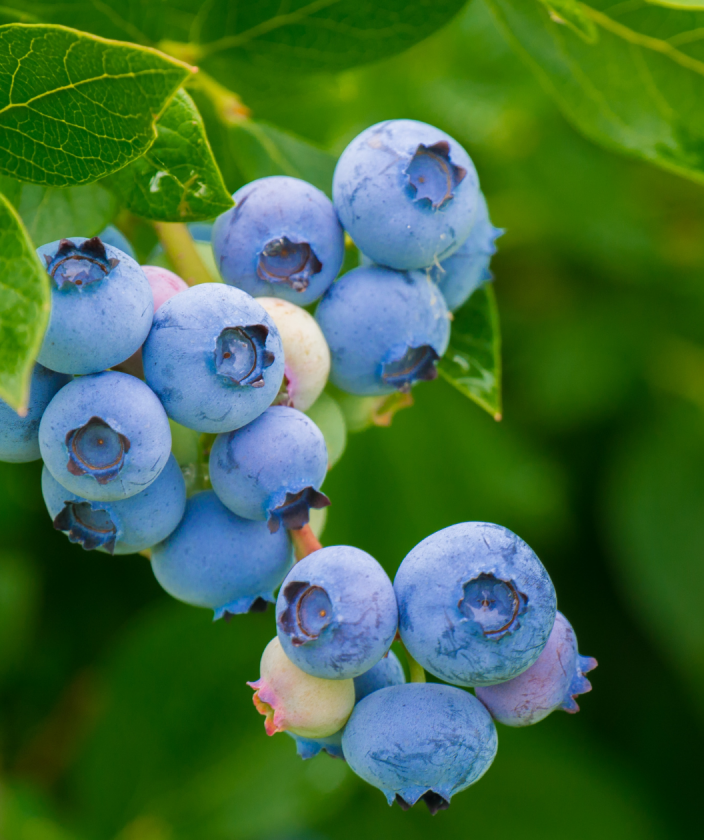A classic, flavorful blueberry that brings abundant harvests, stunning color, and timeless charm to every garden
FEATURES:
- Sold in bundles
- Produces large, sweet, aromatic blueberries
- Midseason variety with heavy, consistent yields
- Self-pollinating and hardy in northern climates
- Fragrant white blooms in spring
- Brilliant orange-red fall foliage
- Excellent for fresh eating, baking, or preserves
- Ships on our trucks because of the size of the plant; does not fit in a box
- Due to federal and state laws, we are unable to ship to: GA, MI
Bower & Branch Landscape Design Tip
Plant Blueray in full sun and acidic, well-drained soil for the best fruit production. If your soil leans alkaline, amend with peat moss, composted pine bark, or an acid-based soil mix. Water regularly, especially during flowering and fruiting, and mulch to conserve moisture and maintain even soil temperature. Prune in late winter to remove old or crowded canes and to encourage fresh new growth. Although Blueray is self-pollinating, planting it near another variety like Bluecrop or Patriot will boost yields and berry size.
Growth Facts
- Hardiness Zone: 4-7
- Mature Height: 4-6' tall
- Mature Width: 3-5' wide
- Exposure: Full Sun
- Spacing: 4-5' apart
A classic, flavorful blueberry that brings abundant harvests, stunning color, and timeless charm to every garden
FEATURES:
- Sold in bundles
- Produces large, sweet, aromatic blueberries
- Midseason variety with heavy, consistent yields
- Self-pollinating and hardy in northern climates
- Fragrant white blooms in spring
- Brilliant orange-red fall foliage
- Excellent for fresh eating, baking, or preserves
- Ships on our trucks because of the size of the plant; does not fit in a box
- Due to federal and state laws, we are unable to ship to: GA, MI
Bower & Branch Landscape Design Tip
Plant Blueray in full sun and acidic, well-drained soil for the best fruit production. If your soil leans alkaline, amend with peat moss, composted pine bark, or an acid-based soil mix. Water regularly, especially during flowering and fruiting, and mulch to conserve moisture and maintain even soil temperature. Prune in late winter to remove old or crowded canes and to encourage fresh new growth. Although Blueray is self-pollinating, planting it near another variety like Bluecrop or Patriot will boost yields and berry size.
Growth Facts
- Hardiness Zone: 4-7
- Mature Height: 4-6' tall
- Mature Width: 3-5' wide
- Exposure: Full Sun
- Spacing: 4-5' apart
Why plant Blueray Highbush Blueberry?
Pick your own bushel of blueberries with Blueray Blueberry, a perfect plant to provide you with buckets full of extra large (and extra sweet) berries! Bearing fruit mid-season, you're landscape will become enriched in the smell of fresh blueberries signalling that the light blue berries are ripe for picking! A belly full of berries and plenty more for jam! So plant today, and watch the beautiful pink blossoms turn into sweet edible blueberries for you and the family to enjoy!
How to use Blueray Highbush Blueberry in the landscape?
Enjoy the dainty white bell-shaped blooms in spring right before they grow the berries you'll be craving all year. However, Blueray Highbush is self-fertile to ensure that you produce the best blueberry crop and plant other blueberry bushes to cross-pollinate. Growing different varieties will extend your harvest season between early, mid, and late-season plants. Be sure to harvest the blueberries before the birds do! If you are worried that our winged friends will enjoy the harvest before you, place a net over Blueray to preserve the berries.
How To Plant Blueray Highbush Blueberry
Acid soil is key to growing Blueberries successfully. These peat-loving Accents require very low–pH conditions to thrive. If your soil isn’t naturally acidic, you may want to grow Blueray Blueberry in a large container or raised bed. Give it all-day sun if possible and use lots of organic matter—both as a soil amendment and mulch. Water weekly if no rain falls. Even though Blueray is self-pollinating, you may want to plant other blueberry varieties to increase your yearly berry yield. Pruning should be completed in late winter after the second year of being planted.
Frequently Asked Questions
Blueray is a midseason variety that typically ripens in July, providing a steady harvest of large, flavorful berries in the heart of summer.
No. Blueray is self-pollinating, but planting it near other blueberry varieties like Bluecrop or Duke can increase your yield and improve fruit size.
Blueray is known for its rich, classic blueberry flavor and cold hardiness. It also offers exceptional ornamental value with fragrant blooms and brilliant fall color.





